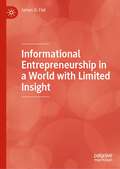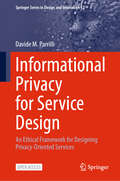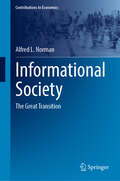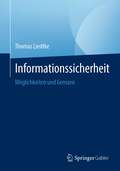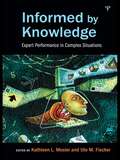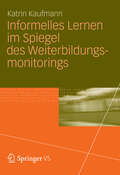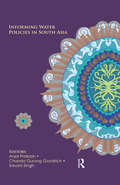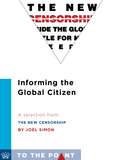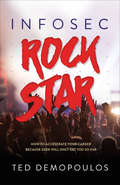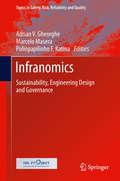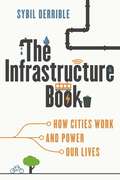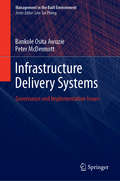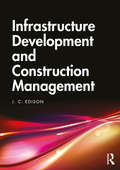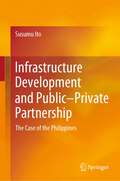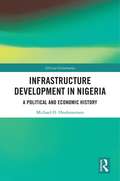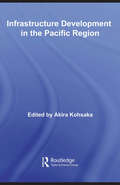- Table View
- List View
Informational Entrepreneurship in a World with Limited Insight
by James O. FietThis book organizes entrepreneurship theory in a way that constitutes a new body of knowledge, which is Informational Entrepreneurship. It can serve as a basis for teaching entrepreneurship and reducing performance uncertainty. Although entrepreneurship is not entirely about information, information determines how it can be systematically understood while depending less on luck. It also offers the only known, experimentally tested approach that incorporates decision support tools. Other known approaches rely on exposition for validation; whereas, Informational Entrepreneurship uses two-sample experiments that controlled for other explanations as well as experimenter bias. It will appeal to those studying and teaching entrepreneurship who are looking for a prescriptive approach, rather than a descriptive approach.
Informational Privacy for Service Design: An Ethical Framework for Designing Privacy-Oriented Services (Springer Series in Design and Innovation #52)
by Davide M. ParrilliThis open access book equips designers with a deeper understanding of informational privacy, emphasizing why and how designers should design services that respect and enhance people’s privacy. The solution to these issues is more important and challenging in our globalized service and design landscape. In their quest to understand the rationale for privacy in service design, authors embarked on an extensive journey through various disciplines and practices. Ultimately, author grounded their findings in ethics and philosophy from a designerly (thus pragmatic) and multicultural perspective. The next challenge has been to translate these ethical and philosophical principles into practical guidelines for designers: an easy to implement and global privacy ethical framework for service designers.
Informational Society: The Great Transition (Contributions to Economics)
by Alfred L. NormanThis book explores the transition into a future economy where human work is largely replaced by automation. As this transition takes place job destruction will outpace job creation resulting in increasing unemployment. The author theorizes that the key challenges in managing this transition will be providing income for the unemployed, reforming a government dominated by the wealthy and corporate interests, and creating new social structures to replace work as a central focus of life. The book begins with a discussion of the concept of bounded rationality and how it influences the pace of technological adoption. The author also discusses how advances in technology—particularly in automation—affect both physical and informational tasks, transforming industries and reducing employment across sectors. Next, the author turns to government, addressing successes and failures in addressing current issues like climate change, immigration, economic inequality, and government capture by the wealthy and corporations. Government reform is essential for managing the social and economic impacts of automation. Positing that the transition period will begin between 2030 and 2050, the author recommends that planning should begin now to implement solutions, including a negative income tax, affordable housing, and a shift towards leisure-based social organization.
Informationssicherheit: Möglichkeiten und Grenzen
by Thomas LiedtkeDieses Buch erklärt die wichtigsten Fachbegriffe und Inhalte und ordnet diese den entsprechenden Bereichen zu. Einbezogen werden auch scheinbare Randgebiete, die für die Informationssicherheit ebenfalls eine Rolle spielen. So wird der Themenkomplex Safety und Privacy hinsichtlich seiner Gemeinsamkeiten und Unterschiede beleuchtet. Das Buch zeigt aktuell verwendete Angriffsmuster und wie man sich dagegen schützen kann. Schutz muss dabei sowohl auf technischer Ebene (z. B. durch den Einsatz von Kryptographie) als auch auf organisatorischer und personeller Ebene (z. B. durch entsprechende Managementsysteme und Awareness-Schulungen) erfolgen. Wie lässt sich feststellen, wie sicher Daten sind? Wie lassen sich relevante Bedrohungen finden, gegen die man sich schützen muss? Wie verlaufen Risikoanalysen?
Informed by Knowledge: Expert Performance in Complex Situations (Expertise: Research and Applications Series)
by Kathleen L. Mosier Ute M. FischerThe focus of this book is on how experts adapt to complexity, synthesize and interpret information in context, and transform or "fuse" disparate items of information into coherent knowledge. The chapters examine these processes across experts (e.g. global leaders, individuals in extreme environments, managers, police officers, pilots, commanders, doctors, inventors), across contexts (e.g. space and space analogs, corporate organizations, command and control, crisis and crowd management, air traffic control, the operating room, product development), and for both individual and team performance. Successful information integration is a key factor in the success of diverse endeavors, including team attempts to climb Mt. Everest, crowd control in the Middle East, and remote drilling operations. This volume is divided into four sections, each with a specific focus on an area of expert performance, resulting in a text that covers a wide range of useful information. These sections present well-researched discussions, such as: the management of complex situations in various fields and decision contexts; technological and training approaches to facilitate knowledge management by individual experts and expert teams; new or neglected perspectives in expert decision making; and the importance of ‘modeling’ expert performance through techniques and frameworks such as Cognitive Task Analysis, computational architectures based on the notion of causal belief mapping such as ‘Convince Me,’ or the data/frame model of sensemaking. The volume provides essential reading for researchers and practitioners of Naturalistic Decision Making and those who study Expertise; Organizational and Cognitive Psychologists; and researchers and students in Business and Engineering.
Informelle Kommunikation in virtuellen Teams (BestMasters)
by Kathrin SuslikIn diesem Buch wird thematisiert, wie die Virtualisierung von Teams den Umfang der informellen Kommunikation zwischen den Teammitgliedern beeinflusst und durch welche Faktoren dieser Einfluss moderiert wird. Dazu wurden nach einer Darstellung des Forschungsstands und Begründung der Forschungslücke aus der Theorie sieben Untersuchungshypothesen hergeleitet und diese anhand einer qualitativen Studie überprüft. Die Untersuchung ergab, dass der Umfang informeller Kommunikation bezogen auf die Häufigkeit der Interaktionen bei virtueller Zusammenarbeit erheblich abnimmt. Die Ergebnisse weisen auf eine diesen Einfluss moderierende Wirkung der Aufgabeninterdependenz, der Medienreichhaltigkeit, des mit der Kontaktaufnahme verbundenen Aufwands sowie des sozio-emotionalen Zustands des Teams hin. Auf Basis der Ergebnisse werden Implikationen für Forschung und Praxis abgeleitet.
Informelles Lernen im Spiegel des Weiterbildungsmonitorings
by Katrin KaufmannTrotz der zunehmenden - vor allem bildungspolitisch geprägten - Bedeutungszuschreibung des informellen Lernens als relevante Form der Bildungsbeteiligung Erwachsener, liegen in und für Deutschland aktuell keine Längsschnitt- oder Trendanalysen zur tatsächlichen Beteiligung vor. Auf der Grundlage der Scientific-Use-Files der Querschnitterhebungen 1994-2007 des Berichtssystems Weiterbildung (BSW) wurden für diese Studie die Möglichkeiten und Grenzen trendanalytischer Betrachtungen des informellen berufsbezogenen Lernens untersucht. Fokussiert werden Funktionen und kontextuelle Einbindungen in Erwerbstätigkeit der informellen Lernaktivitäten. Im Ergebnis zeigt sich einerseits die Relevanz einer differenzierteren Betrachtung informellen Lernens Erwachsener und darüber hinaus werden die Möglichkeiten trendanalytischer Betrachtungen von Beteiligungsmustern unter sich ändernden Erhebungsformaten deutlich.
Informing Water Policies in South Asia
by Anjal Prakash Chanda Gurung Goodrich Sreoshi SinghThis book analyzes water policies in South Asia from the perspective of Integrated Water Resources Management (IWRM). It seeks to address the problems of water scarcity, conflict and pollution resulting from the gross mismanagement and over-exploitation of this finite resource. Highlighting the need for IWRM in mitigating abuse and ensuring sustainable use, it discusses issues relating to groundwater management; inter-state water conflicts; peri-urban water use; local traditional water management practices; coordination between water users and uses; and water integration at the grassroots level. With case studies from India, Bangladesh, Pakistan, and Nepal, the innovative, painstaking and transnational researches presented in the volume deal with questions of equity, gender, sustainability, and democratic governance in water policy interventions. It will interest researchers and students of development studies, environmental studies, natural resource management, water governance, and public administration, as also water sector professionals, policymakers, civil society activists and governmental and nongovernmental organizations.
Informing the Global Citizen: A Selection from The New Censorship: Inside the Global Battle for Media Freedom (To the Point)
by Joel SimonToday, anyone with an iPhone can provide firsthand accounts from the world's front lines. Despite our increased access to events around the world, journalists are more vital than ever as they bring context and perspective and help to set the humanitarian agenda. However, threats to journalists are mounting with record numbers killed and imprisoned each year. From the drug wars of Mexico to Iraq and Tahrir Square, Joel Simon explores the new challenges and dangers to the future of journalistic freedom.
Infosec Rock Star: How to Accelerate Your Career Because Geek Will Only Get You So Far
by Ted DemopoulosHave you noticed that some people in infosec simply have more success than others, however they may define success? Some people are simply more listened too, more prominent, make more of a difference, have more flexibility with work, more freedom, choices of the best projects, and yes, make more money. They are not just lucky. They make their luck. The most successful are not necessarily the most technical, although technical or "geek" skills are essential. They are an absolute must, and we naturally build technical skills through experience. They are essential, but not for Rock Star level success. The most successful, the Infosec Rock Stars, have a slew of other equally valuable skills, ones most people never develop nor even understand. They include skills such as self direction, communication, business understanding, leadership, time management, project management, influence, negotiation, results orientation, and lots more . . . Infosec Rock Star will start you on your journey of mastering these skills and the journey of moving toward Rock Star status and all its benefits. Maybe you think you can’t be a Rock Star, but everyone can MOVE towards it and reap the benefits of vastly increased success. Remember, “Geek” will only get you so far . . .
Infosys (A): Strategic Human Resource Management
by Thomas J. Delong Jaya Tandon Ganesh RengaswamyHema Ravichandar, head of human resources, was given a new and aggressive milestone to reach: ensure Infosys is on the Top 10 lists of both Best Performing Companies and Best Employers by 2007. No large organization had ever been able to achieve this distinction because of the tension between the need to control costs for financial performance and the expenditure required for employee satisfaction. Ravichandar was aware of the humbling experiences of the past that made Infosys cognizant of the difficulties ahead as it transitioned from a small to a large company.
Infosys (B): Strategic Human Resource Management
by Thomas J. Delong Jaya TandonSupplements the (A) case.
Infosys Technologies
by Thomas J. Delong Ashish NandaCreating and sustaining a third-world-based technology company to compete globally (i.e. in the first-world) poses many challenges. Such challenges are examined through the genesis and progression of Infosys Technologies Ltd. Key decisions made by Chairman N.R. Narayana Murthy are particularly highlighted.
Infosys and TCL: Unshackling Indigenous Enterprise
by Tarun KhannaThis chapter examines how local entrepreneurs in China and India are building successful enterprises in very different ways, comparing the rise of one of China's leading companies, TCL Corporation, a leading manufacturer of consumer electronics, with the rise of Infosys, one of India's leading software companies, and a pioneer of off-shoring.
Infosys in India: Building a Software Giant in a Corrupt Environment
by Rawi Abdelal Rafael Di Tella Prabakar KothandaramanShortly after Infosys was founded in 1981, its managers faced a major turning point when they made a decision to operate without giving in to the petty corruption rife in the Indian economy. Within just a few years, that decision had truly defined the company. Over the next 25 years, Infosys managers went to extraordinary lengths to avoid even the most modest of practices that they considered inappropriate. Explores the practices and methods that Infosys adopted instead, considers their costs, benefits, and generalizability, and contextualizes the problem within Indian political and economic institutions that continue to evolve.
Infosys' Relationship Scorecard: Measuring Transformational Partnerships
by Robert S. Kaplan F. Asis Martinez-Jerez Katherine MillerThis case analyzes Infosys' innovative approach to measuring performance in client relations. Infosys' strategy is evolving to build transformational partnerships from its original position as an outsourcer of end-to-end IT projects. A transformational partner helps clients to devise and implement strategies that will allow them to achieve a competitive advantage. The traditional paradigm of service-level agreements (SLAs), while sufficient for Infosys' needs early on, is not able to achieve the level of understanding that transformational partnerships require. Infosys applies the principles of the Balanced Scorecard (BSC) to produce a feedback mechanism that allows the partnership to grow to the benefit of both parties.
Infosys: Born Global to Exploit the Skilled Workforce Advantage--A Profile of One of India's Pioneering Multinationals
by Nirmalya Kumar Pradipta K. Mohapatra Suj ChandrasekharThe Indian outsourcing industry has helped put India on the global corporate map. Of the many famous Indian IT companies like Infosys, TCS, and Wipro, Infosys served as the outsourcing blueprint for global technology companies as well as Indian companies in other sectors. This chapter begins with its story and then examines the rest of the Indian IT industry and its evolution. This chapter is excerpted from "India's Global Powerhouses: How They Are Taking on the World."
Infosys: Financing an Indian Software Start-Up
by William J. Coughlin Walter KuemmerleDescribes the financing and growth of Infosys, an Indian software start-up. Infosys defies a number of stereotypes about barriers to entrepreneurship in India. The company was founded by a small group of entrepreneurs with little equity and without backing from a large family conglomerate. While Infosys has been very successful recently, there was also a highly uncertain period in the company's history. At the time of the case, Mr. Murthy, Infosys' CEO, and his team once again face important challenges regarding future growth and financing. Infosys' shares trade on the Bombay Stock Exchange. The company must decide whether it should seek to also list its shares on a U.S. stock exchange and, if yes, whether to list on NASDAQ or NYSE.
Infranomics
by Adrian V. Gheorghe Polinpapilinho F. Katina Marcelo MaseraThis book provides a rough entry into the interdisciplinary field of Infranomics. It enables better decision making in an increasing ambiguous, complex, emergent, interdependent, and uncertain world where we attempt to anticipate modern society trends and patterns in order to react appropriately. However, as with any emerging discipline, much research is needed at the applications and conceptual level. The applications level may require development and testing of methods, tools, and techniques to enable analysis and decision-making in ambiguous, complex, emergent, interdependent, and uncertain conditions while the conceptual level may require taping into driving philosophies, theories, and methodologies that form the basis for Infranomics. Striking the right balance between applications and conceptual foundation (theory) requires rigorous research. This book provides a springboard for robust discussions on applications, theory, and transformation of current thinking to better deal with modern society's problematic issues using Infranomics.
Infrastructure Book: How Cities Work and Power Our Lives
by Sybil Derrible&“[A] penetrating analysis of urban infrastructure…&” —NatureClean water, paved roads, public transit, electricity and gas, sewers, waste processing, telecommunication, even the Internet – all this infrastructure is what makes cities work and powers our lives, often seamlessly and silently. Virtually everything we do and consume depends on infrastructure. Yet, most people have little to no idea how these systems work. How is water treated? How do cities manage rainwater? Why do traffic jams exist? How is electricity generated and distributed? What happens to trash after it is picked up? How does the Internet work?In The Infrastructure Book, world-renowned urban engineering expert Sybil Derrible reveals the behind-the-scenes machinations of the foundational systems that make our societies function. Visiting sixteen cities around the world and their unique approaches to organizational challenges – from water distribution in Hong Kong to waste management in Tokyo, and from Chicago&’s power grid to low Earth orbit satellites in space – this highly readable book uses fascinating case studies and historical detours to show how infrastructure works – and, sometimes, doesn&’t.With large-scale infrastructure repairs looming and the need for existing infrastructure to be transformed, the book also shows how infrastructure can be more sustainable and resilient. After reading The Infrastructure Book, readers will never look at a city the same way.
Infrastructure Delivery Systems: Governance and Implementation Issues (Management in the Built Environment)
by Peter McDermott Bankole Osita AwuzieThis book provides a framework for governing policy implementation by various stakeholders during the delivery of infrastructure projects. This framework relies on the tenets of the Viable Systems Model (VSM), a systems cybernetic model that enjoys a high level of acceptance in organizational analysis. The book presents a step-by-step guide for the multi-level governance of implementation during project delivery. Although the book focuses on the context of local content development policy and construction projects (infrastructure), it is presented in a manner that allows it to be adapted to other policies and sectors. The book includes a step-by-step methodology for assessing policy implementation in project or policy delivery systems. In addition, it shares insights into the probable challenges faced by the actors within the delivery system in achieving optimal implementation performance. Critical success factors are also highlighted, and illustrative diagrams of the framework are provided to facilitate understanding. The book is logically structured and presented in a straightforward manner. Also, the transposition of the VSM from a conventional organizational context to a multi-organizational context will appeal to readers with a background in systems thinking, monitoring or evaluation.
Infrastructure Development and Construction Management
by J. C. EdisonThis is a comprehensive book on infrastructure development and construction management. It is written keeping in mind the curricula of construction management programmes in India and abroad. It covers infrastructure development, the construction industry in India, financial analysis of the real estate industry in India, economic analysis of projects, tendering and bidding, contracts and contract management, FIDIC conditions of contract, construction disputes and claims, arbitration, conciliation and dispute resolution, international construction project exports and identifying, analysing and managing construction project risk. Thus, this book covers most of the construction management activities that are carried out at different stages of a construction project. This is an essential book for students of construction management, construction professionals, academicians and researchers.
Infrastructure Development and Public–Private Partnership: The Case of the Philippines
by Susumu ItoThis is the first book that analyzes public–private partnership (PPP) infrastructure development in developing countries by focusing on recent developments in the Philippines.Infrastructure is extremely important for economic development and poverty reduction. However, given the infrastructure gap and pressures on public expenditure, there is a growing expectation that PPP will fill this gap globally. Over the years, PPP as a mechanism for financing and procuring infrastructure has been the basis of an active and provocative debate in the Philippines, which is known to have inadequate infrastructure—twice in the 2010s, when a significant policy shift on the financing source of public infrastructure was announced by the Philippine government. Drastic policy changes concerning the roles of public finance and PPP in infrastructure development within this decade are not seen in other developing countries.There is no precedent for substantial study on the changes of infrastructure governance in the Philippines, but this book assesses policy changes in infrastructure development in the country and, as academic contributions, identifies several factors behind the changes related to infrastructure governance there, especially the drastic shifts during the Aquino III and Duterte administrations. Furthermore, the findings presented in the book, including the desirable role of public finance and PPP in developing infrastructure in developing countries, could improve infrastructure governance, such as choice of the financing mode, design, and implementation of the PPP project, in other developing countries as an operable contribution to policymakers of government and to industry and management practitioners.
Infrastructure Development in Nigeria: A Political and Economic History (African Governance)
by Michael O. OnolememenThis book examines the politics and economics of infrastructure development in Nigeria from Independence in 1960 up to 2015, and the role of good governance in promoting the socioeconomic wellbeing of citizens. Arguing for the need for transformational leadership in infrastructure development, the chapters examine policy issues and survey the various administrative, economic, and social-political reforms that have impacted infrastructure development in Nigeria. The author also discusses current national development plans and Vision 20:2020; challenges to infrastructure development, including corruption; and the future potential of a strong infrastructure network for the economy and citizens. Drawing upon his experience within government departments, as well as existing models of leadership and governance, the author explores the role of infrastructure development in promoting the wellbeing and growth of Nigeria. Combining theory with practical examples of good governance, this book will be of interest for students and researchers of political science and infrastructure development in Africa.
Infrastructure Development in the Pacific Region (Routledge Studies in International Business and the World Economy)
by Akira KohsakaIn the past, undersupply of public infrastructure was blamed for low productivity growth in the United States in the 1970s, while greater private sector participation was emphasized for infrastructure development in the Asia-Pacific region before the Asian Economic Crisis in the 1990s. This revealing book looks at the current economic situation and the state of infrastructure on both sides of the Pacific. Including contributions from leading authorities such as Satya Paul, Jim Storey, Tony Makin and Naoyuki Yoshino, this book closely investigates the experiences of Japan, Canada, the US, China, Korea and Australia.
